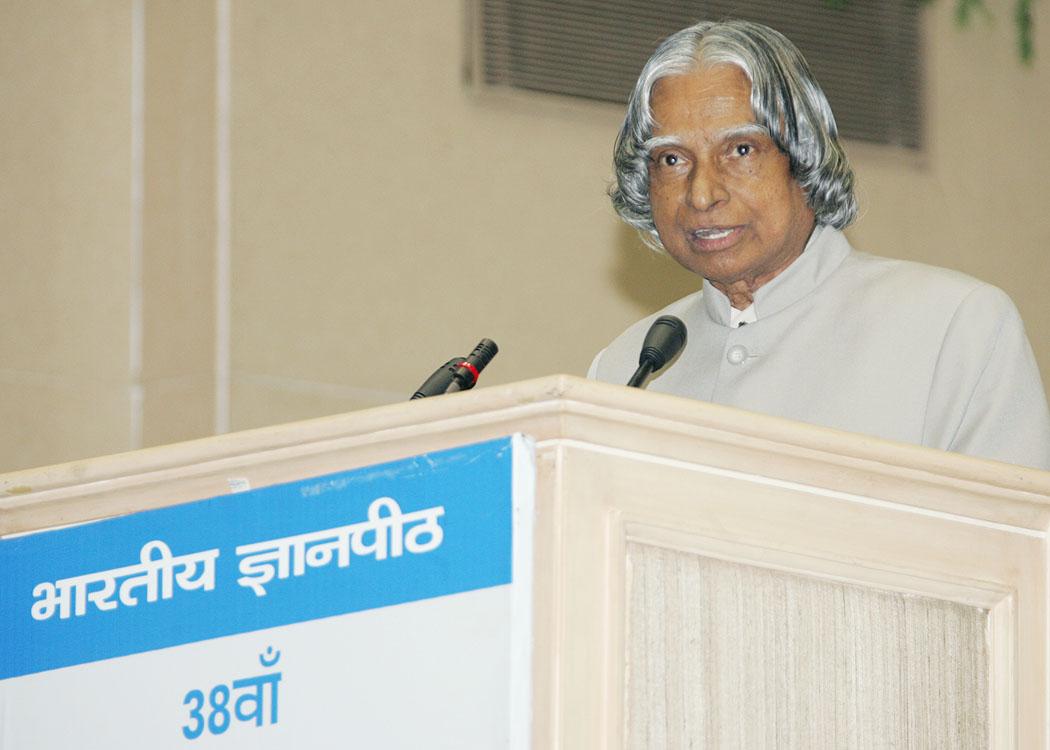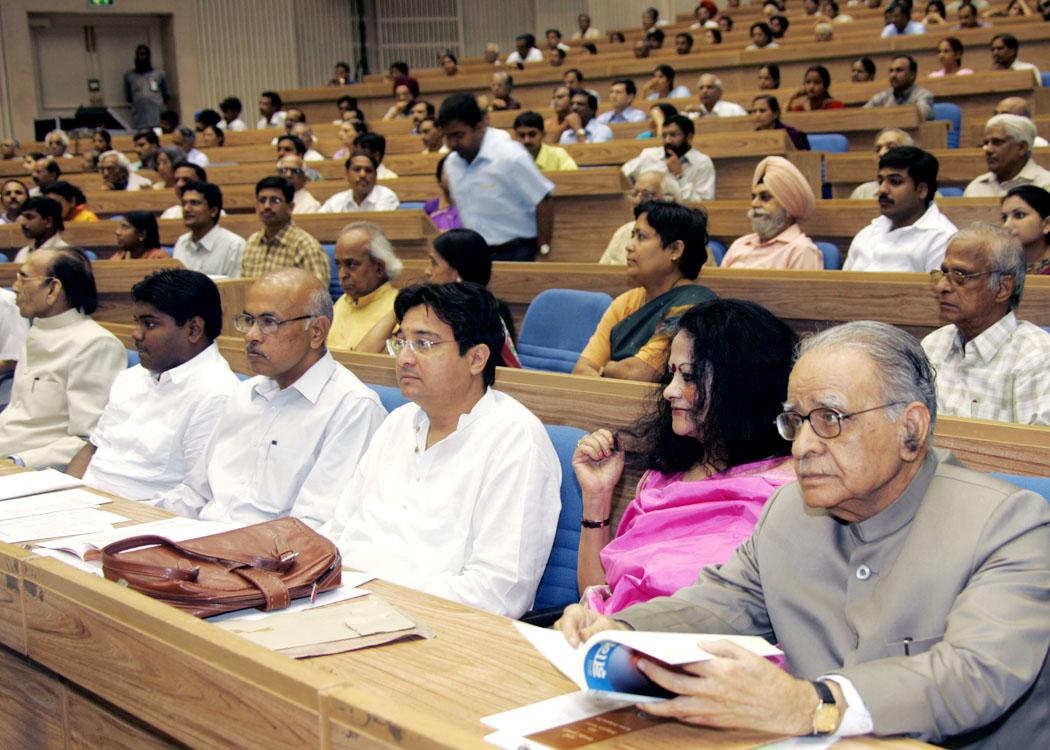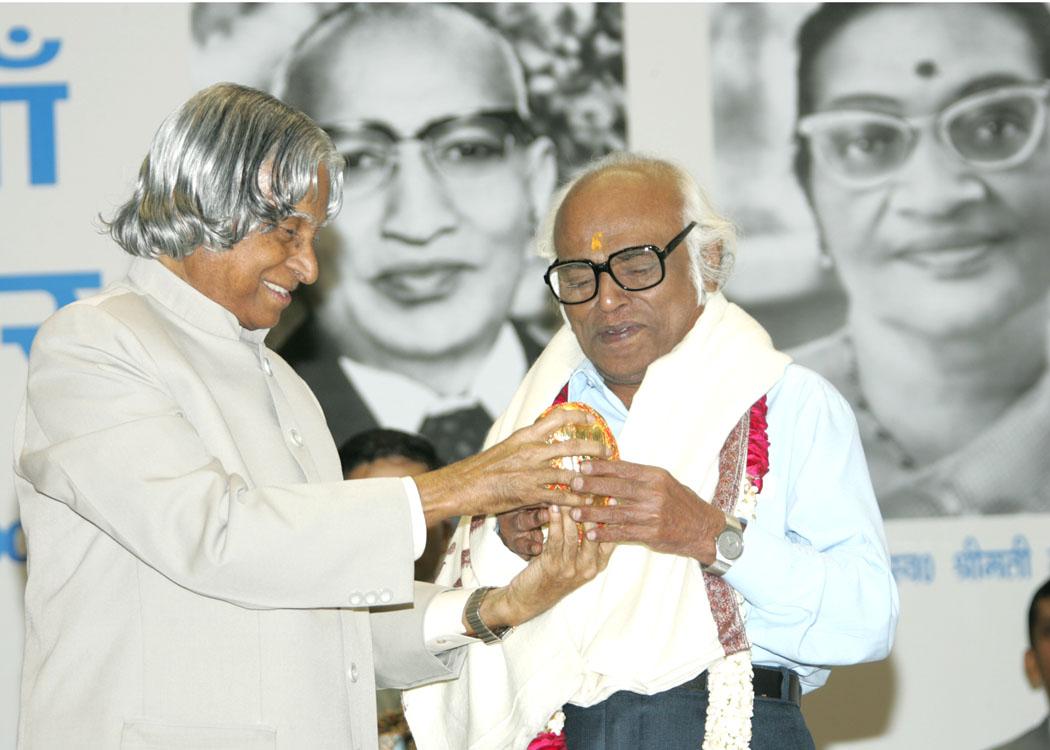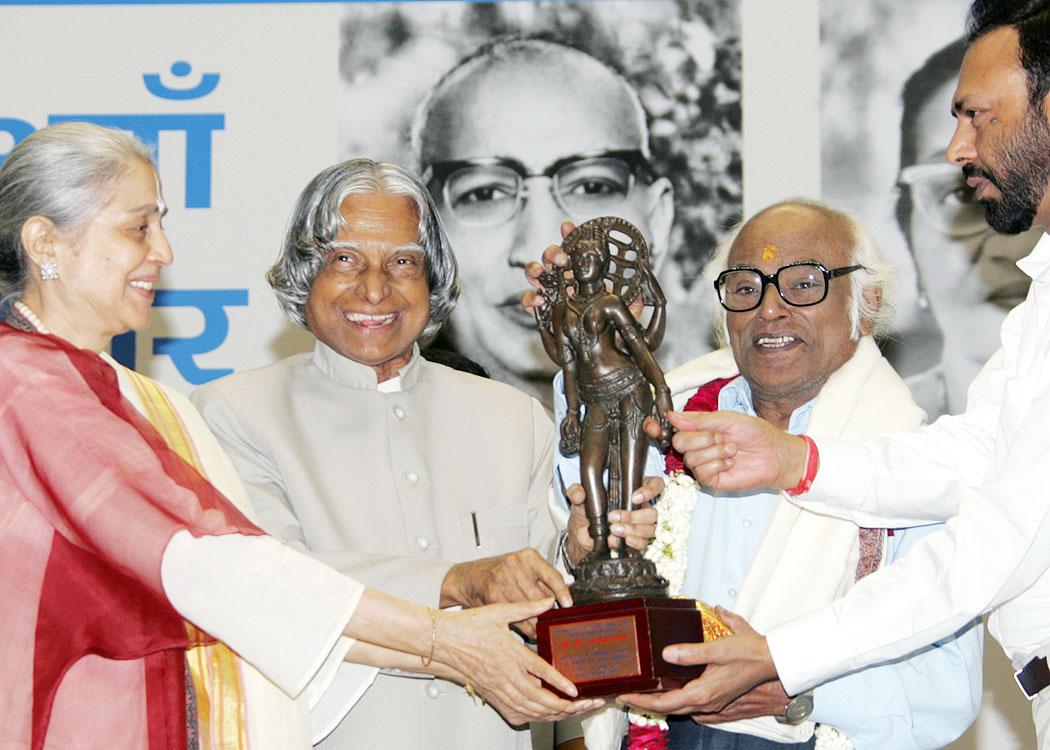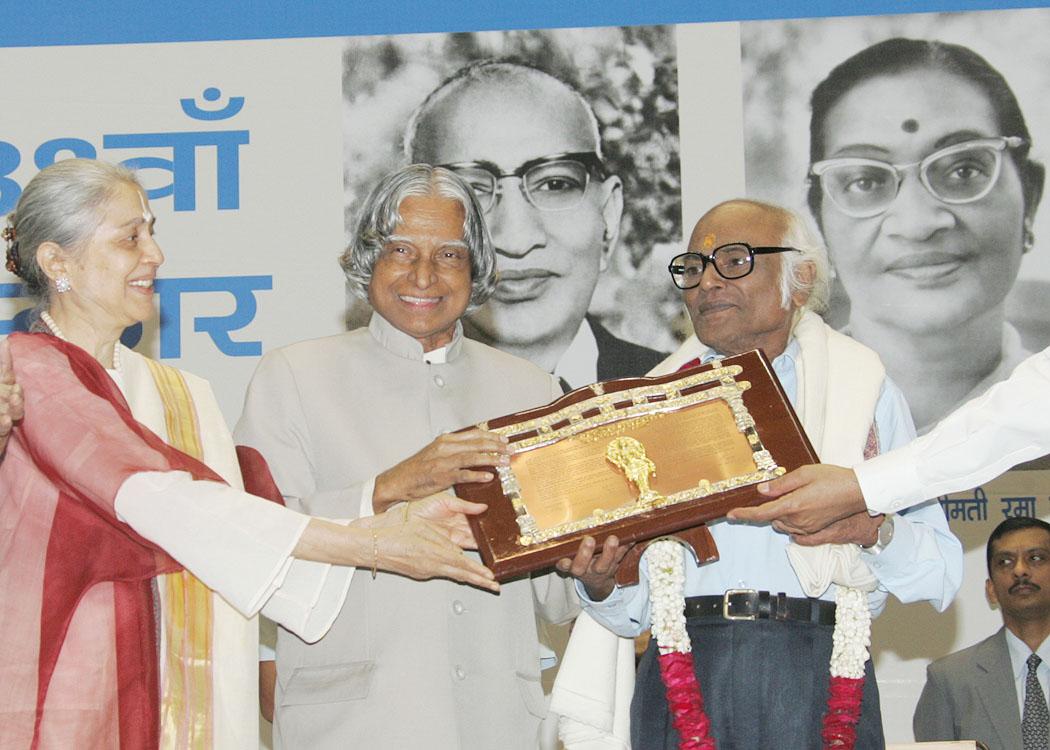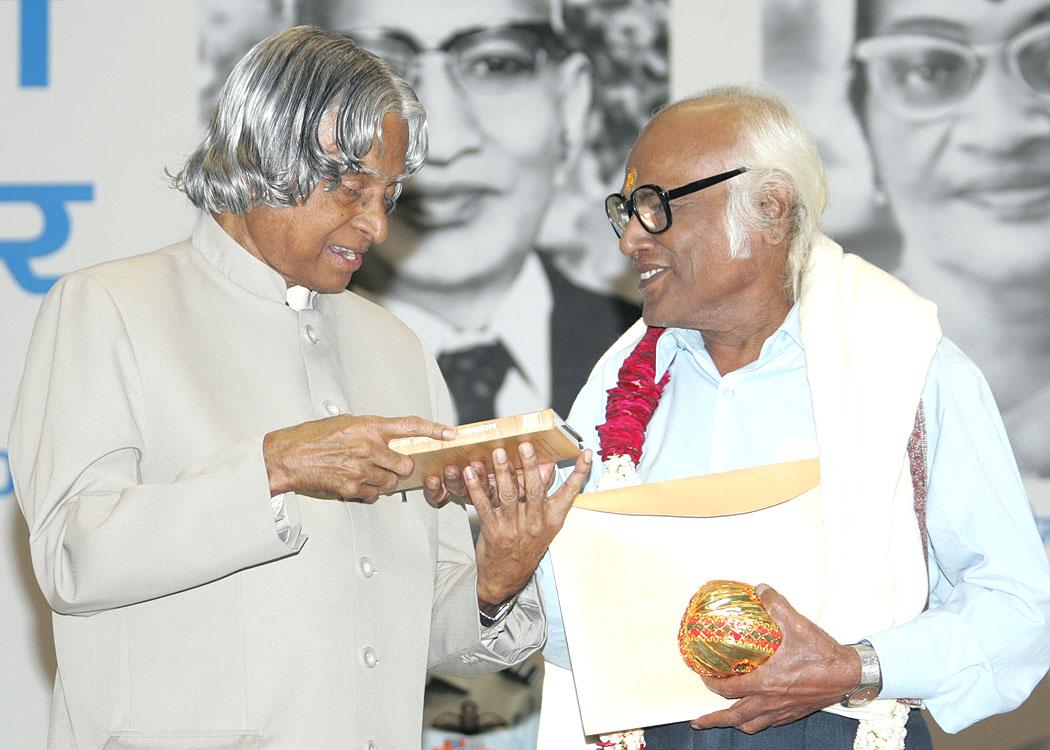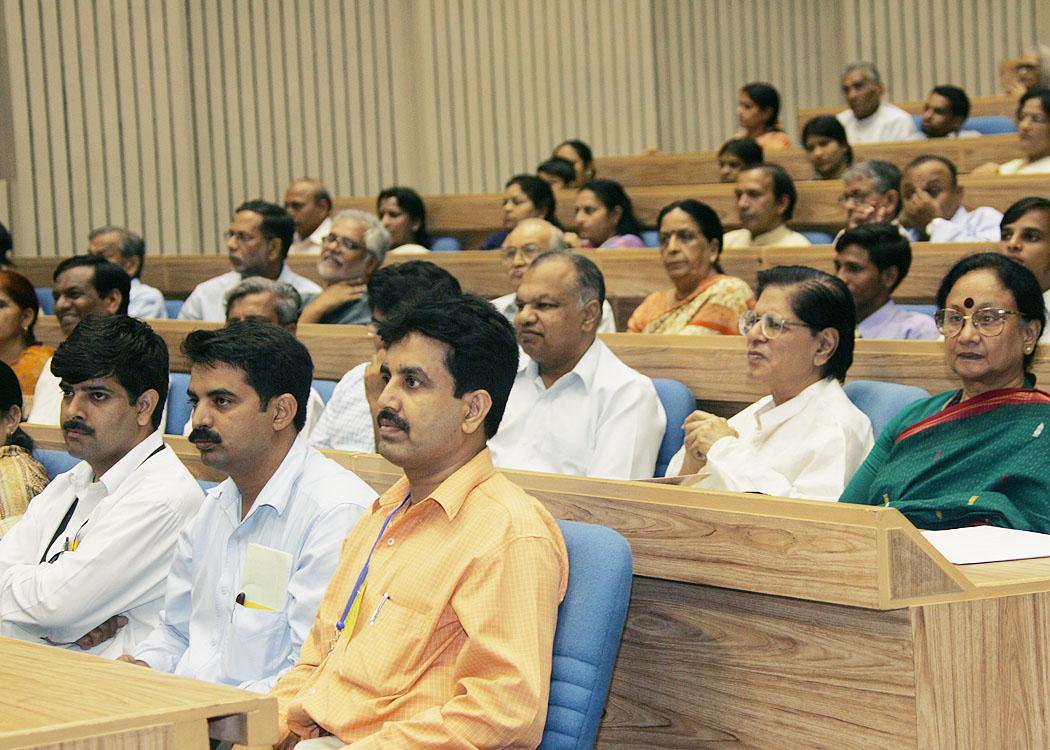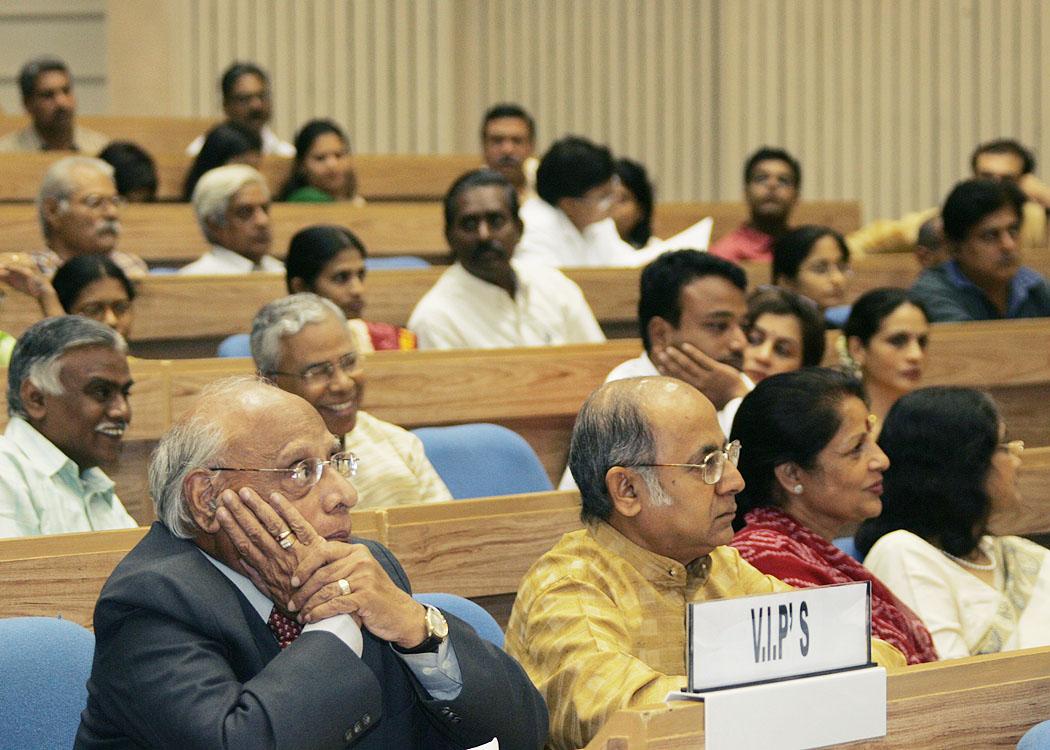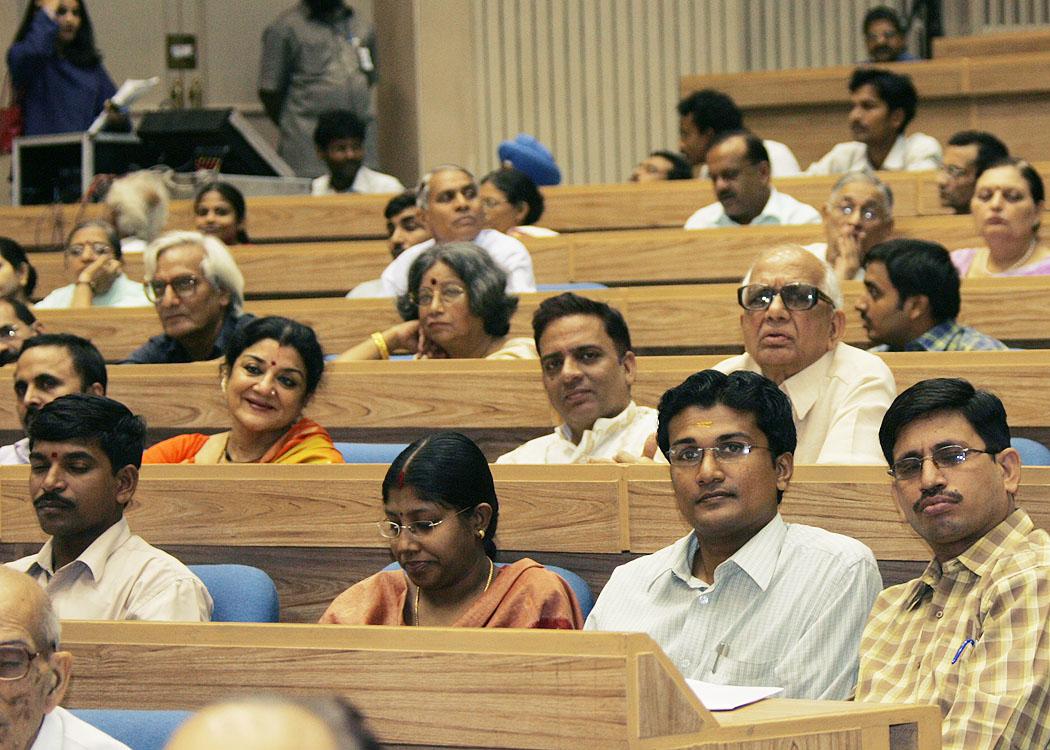Address At The Conferment Of 38Th Jnanpith Award For 2002, New Delhi
New Delhi : 27-09-2005
Thinkers and the dynamics of society
I am delighted to participate in the function to confer the 38th Jnanpith Award for the year 2002. I greet the President and trustees of Bharatiya Jnanpith eminent thinkers and writers and distinguished guests. The Bharatiya Jnanpith during its last four decades of existence has honoured many thinkers of Indian literature who have contributed to the promotion of excellence in literature in as many as twelve different Indian languages. Every year, Bharatiya Jnanpith is selecting the Indian literature of excellence. Works of the awardees have to be properly translated by a translator who enters into the mind of the author and translates it with a mission. Then only the excellence of Indian literature will reach the literary world and get recognized. I extend my congratulations to Thiru Jayakanthan, the recipient of this year?s prestigious award. He is a land mark in Tamil prose writing and has contributed immensely to the enrichment of the language through his short stories, novellas, novels, and essays during the last five decades. The very fact there was an unanimous acclamation when the 2002 Jnanpith Award was announced indicates the undisputed literary stature enjoyed by Thiru Jayakanthan in Tamil literature . Today, I would like to share a few thoughts on the topic "Thinkers and the dynamics of society".
My Experience in Mizoram
A few days back, I visited the North-eastern States like Sikkim, Assam, Meghalaya and Mizoram. I had an occasion to meet many literary personalities and thinkers of North Eastern languages. They have contributed many literary works, including in the form of cultural programmes. I was moved to see a unique musical and dance performance in Mizoram. Also in Sikkim, I saw a fusion of culture of three groups of people, namely, Nepali, Bhutias and Lepchas in that integrated society. The music and dance was so powerful and beautiful that all of us were very happy to see the unity of minds and how these multi cultures got fused when the normal practice seem to be to project the differences prevalent in society.
One of the incidents that reflect the cultural peak of the region happened at Mizoram. Normally, no aircraft takes off from Aizawl, the capital of Mizoram after 1600 hours in the evening. Since I had work in Aizawl up to 2100 hrs and had to return to Delhi that very night, our Airforce organised my departure from Aizawl at that late hour, with certain temporary night take off facilities. I reached the Airport with my team. Then Governor, the Chief Minister, and other officials joined us. I saw an impressive scene unfold in the midst of darkness with only the aircraft lights on. Near the aircraft and at a safe distance, a choir group was in attendance with musical instruments. As soon as they saw me, they gave a beautiful lovely farewell song composed by a Mizo Poet Rokunga. The poem is titled "The World of Parting". It means:
"Now we part with heavy and painful heart
The world we live in has been destined for parting
By the heavenly father above
But we are destined for a better world than this
A city eternal, where we will never know painful
partings"
I was touched by the variety of Indian panorama, emotional content of the tune, cultural diversity and unity of minds in the vast land of ours. I am glad that Bharatiya Jnanpith is sensitive to this fact and honours the accomplished writers in Indian languages listed in the eighth schedule of our Constitution. Personally I would be happy, if we look for the best of literature even beyond the eighth schedule. Developed India means not only economic development but also integrated development in art, literature, humanism, nobility in thinking and above all preservation of over five thousand years of our rich cultural heritage.
One Man, One Home and One World (Oru Manithan Oru Veedu Oru Ulagam)
I happened to read a novel written by Jayakanthan titled Oru Manithan Oru Veedu Oru Ulagam. It means, one human being, one home and one world. This one book I read fully. How many characters, how many events there were, bitter tears in some places and some places sweet. I still remember the noble qualities of Henry and Duraikannu, two leading characters in that novel. Jayakanthan in his preface to that book, says not only ocean and rivers are complete by itself but each drop of water is complete in itself. Continents and countries are not just the world. But each man by himself is a world. It means that the whole world is represented in every one of us with varying sequence of atoms, and thus each atom represents the whole world. Here I am reminded of a prayer written by Mahakavi Bharathiyar as Saraswati Vandanam of Panchali Sabadam. Bharati?s beautiful poetry reads like this:
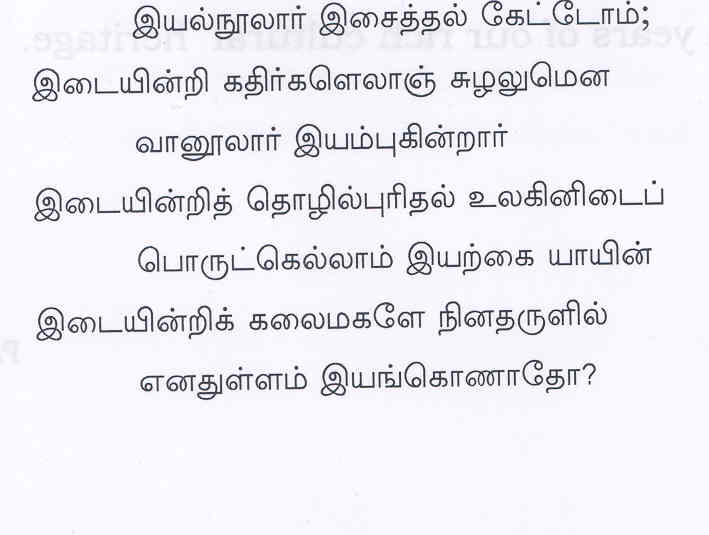
This means: Physicist claim atoms (particles) are always on a orbital motion. Astronomers claim every planet and their stars, galaxies are all on constant motion. If perpetual motion be the nature of things all around us, O! Goddess of Learning Saraswathi ! Kindly bless my mind also to work as vigorously as ever! Jayakanthan looks up to Bharati as one of his gurus.
Jayakanthan sees the world in an atomic capsule of a single individual and Mahakavi wants that individual to reflect the continuous evolution process of that atom: that is, to grow and grow from one moment to the other.
Teacher's Teacher
What I cherished in Jayakanthan's view of life was his introduction to one of his collection of essays titled: Oru Ilakkiyavadhiyan Arasial Anubavangal it means, "A literary person?s political experiences". He says:
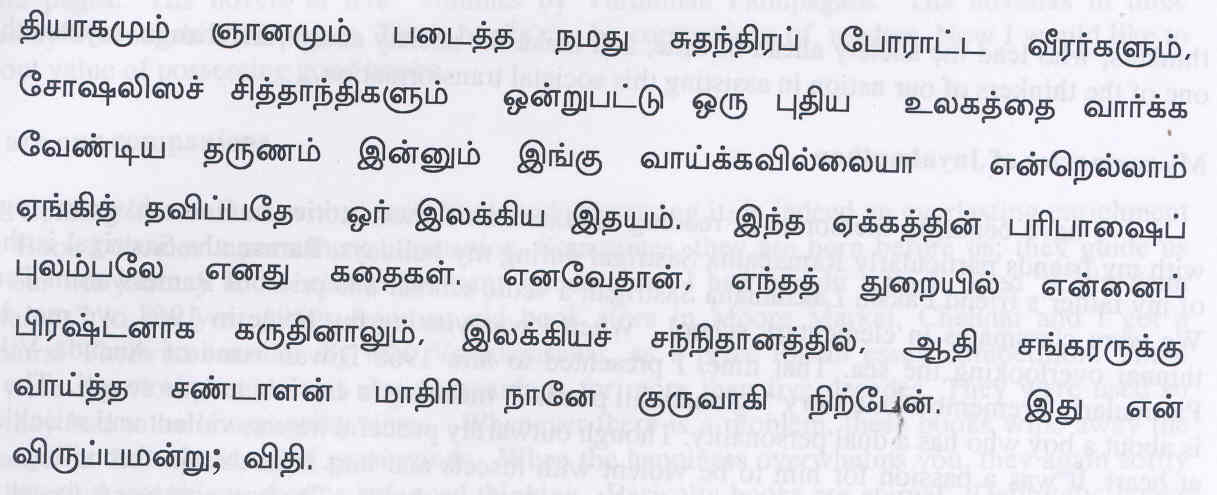
It means:
Has not the time arrived when our freedom fighters and socialist thinkers with knowledge and courage to get together and sacrifice to create a new independent society? When that time will come? The literary mind has a passionate longing for it. This is similar, in a small way to a situation Jayakanthan says: in my writing in literature, even if I am made an outcaste, I will work in the realm of literature, looking for change, as it happened with Jagath Guru Adi Sankaracharya, accepting Dattatreya as Guru. It is not my wish, but it is God's will.
What a beautiful and moving statement. When I read this statement, tears swelled up in my eyes. Because, I see despair and fatalism all around. But faith challenging them. That is how literature elevates the mind. No doubt, Jayakanthan aptly fitted this role of the passerby, as the conscience keeper of the society.
Traverse beyond Oneself
As Jayakanthan said the whole motto of his writings, was to awaken the society to meet the developmental needs of the hour. We can see how relevant it is in the present day context when the nation is endeavouring to unshackle itself from the dormancy which has set in over a period of time. In another context Jayakanthan says:

It means, going beyond times is the corner stone to measure the success of any literature. Going past you (reader) is my (author's) success. Providing a route for the reader to traverse beyond himself or herself is a measure of literature's success. Another name for this is called growth.
It is a beautiful message for the individual, the writer and the mankind. A country is rich because of the natural wealth, biodiversity and its people. But the crowning glory of the nation, is its thinkers, who lead the society ahead of time, and make the society accept the change. Jayakanthan is one of the thinkers of our nation in assisting this societal transformation.
My memories of Jayakanthan
I have beautiful memories of reading Jayakanthan's short stories in Rameshwaram together with my friends particularly Ramanatha Sastrigal during my holidays. Ramanatha Sastrigal is the son of my father?s friend Pakshi Lakshmana Sastrigal, a vedic scholar and priest of Rameswaram Temple. We were classmates in elementary school. When I was visiting my home in 1968, we met in our thinnai overlooking the sea. That time, I presented to him 1968 Diwali issue of Ananda Vikatan. Particularly I remember one story "agraharathil poonai" meaning 'a cat in a temple street'. The story is about a boy who has a dual personality. Though outwardly peaceful he was violent and mischievous at heart. It was a passion for him to be violent with insects and hurt animals. In that village, a cat appears in the Agraharam and was giving trouble to the households. The boy volunteers to get rid of the cat. He catches the cat in a sack with the purpose of harming it. But his way of thinking changes, when he gets an advise not to harm the cat, of all the persons, from a meat-seller. This enlightens the boy and he gets elevated in his thinking process. What a beautiful transformation! The way the transformation took place enters into our hearts.
Jayakanthan as Poet
Jayakanthan also writes poetry. I am told he has written poems for most of his films by himself. I happened to read one of his Venba form of poem recently. Venba is a traditional four liner that measures up to grammatical prescriptions of tamil literature. He says:

It shows another dimension of Jayakanthan?s personality. He is not concerned what the majority thinks or what his followers want him to say. The writer has his mission. It indicates his independence of thinking and gives an insight into his poetic mind, that looks for societal changes well ahead.
Facing the Reality of Life
In one of his admired prefaces he captures the pulse of the Indian psyche. Generally we are soft hearted. We would like to hear only good things in life. Probably that is the reason while narrating the Ramayana we complete it with Sita Kalyanam or Pattabhishekam. Hardly people have a heart to talk about Rama drowning himself in Sarayu river or Sita getting swallowed by Mother Earth. But life as it is, is full of twist and turns, good and evil, happiness and sorrow. Without one the value of the other will not be realized. Jayakanthan says, an author has a duty to depict his characters dispassionately through keen observation and by seeing through the nature of its characteristics. Therefore, if readers acquire senseless liking or sympathy or hatred for a character in the novel or drama, it only means that they do not want to understand the life depicted through the literature.
Treasure of Knowledge
A skillful author provides to the society a spark to trigger the minds of the readers. His collection of short stories have been brought out by Kavitha Publications running into around two thousand pages. His novels in five volumes by Vardhman Pathipagam. His novellas in three volumes by Meenakshi Pathipagam. These books can be companions of readers. Now I would like to talk about value of possessing good books.
Books are our companions
Coming into contact with a good book and possessing it, is indeed an everlasting enrichment of life. Book becomes a permanent companion. Sometimes, they are born before us; they guide us during our life journey and continue for many generations. I had bought a book titled "Light from many lamps" in the year 1950s from an old book store in Moore Market, Chennai and I got a Thirukkural Thelivurai written by Mu. Varadarasanar, as a prize for an essay competition. These books were my close friends and also companions for more than five decades. They were used so much, they had to be bound many times. Whenever there is a problem, these books wipe away the tears based on the experience of great minds. When the happiness overwhelms you, they again softly touch the mind and brings about a balanced thinking. Basically books are eternal. Definitely, books by Indian authors such as Jaya Kanthan has a potential of capturing the world?s imagination.
Conclusion - Indomitable Spirit
In our planet earth, many civilizations had sprung up. But only a few of them survived which had the higher thinking capacity to see the changes, to see the future and the ability to adopt to the dynamic civilization. This ability is indeed the function of thinking capacity created by the literature, poetry, and the dialectical capacity. For example, ancient philosophers and in later years, the scientists, technologists, economists and sociologists all in unison enriched the civilization. Our Indian civilization had accepted the dynamic changes of multicultural impact. That is how, we have a society of a billion people of multi culture, multi language and multi religion with unity of mind. Thanks to our thinkers, we see the tradition of producing epics like Mahabharata and classics like Thirukkural, Kabirvani and Narayaneeyam in our country over a long period of time. The Jnanpith Award recognizes the literary heights achieved by worthy successor of this tradition, in multiple languages. I am very happy to appreciate the literary works of our nation, particularly the work of Jayakanthan, who is being conferred Jnanpith Award today. It is indeed a symbol of promoting the literary tradition.
I feel that our galaxy of thinkers and writers can facilitate the creation of enlightened leaders amongst our youths. Through their writings, they can inspire our younger generation on the capacity for greatness of heart and spirit of mankind and remind them of the need for indomitable spirit with which they can conquer any signs of weakness and despair. This is not a duty cast on the authors, but it is their privilege that they can help mankind endure adversities and succeed in life.
I consider it a great privilege to confer the Bharatiya Jnanpith 2002 Award on Thiru D. Jayakanthan today. May he continue to capture the transformation that our present society is witnessing with his laser vision and provide further impetus to the thinking process among our youth leading to their own development. It will be an invaluable contribution to the cause of developed India.
May God bless you.

